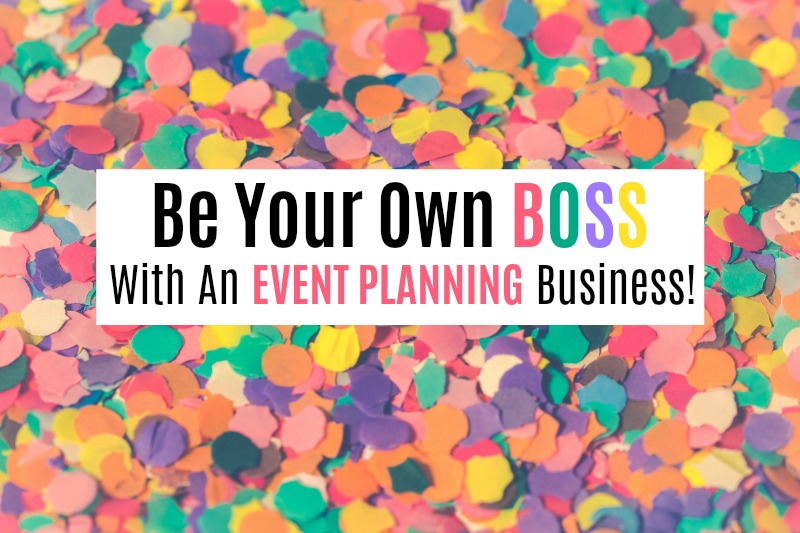If you’re like me, when you think of an event planner, you think of Jennifer Lopez in the 2001 film, The Wedding Planner; crisp, polished, knows what they’ve wanted to do their whole lives, working in a big, fancy office – the whole nine yards.
That may have been the case until recently (i.e., event planners working for big firms), but in 2018, nearly any business can have remote employees — no fancy office with white leather couches needed!
Are You Cut Out For Event Planning?
The first thing you must do before starting a virtual event planning business — or any home business, for that matter — is to identify if it is the right choice for you.
Event planners are typically extroverted; or, even if they’re not, they know that they have to be people-focused.
You’re going to have to build a strong client base and feel comfortable asking for reviews on Yelp!, Google+, and Facebook. Networking is key to building your remote event planning business.
If you’re more introverted or prefer a normal, 9 – 5 desk job, then event planning may not be the best career path for you.
Another key factor in becoming your own boss is having the authority to do so. Anyone can start a business, but it certainly helps when you have multiple years of experience in the field you’re diving into.
Still, tons of experience (or even any experience) isn't always necessary to do well. Look at success story Stacy McCain, for example.
She has been “planning and executing high-end events through her own boutique company, Stacy McCain Events, for seven years.” Stacy operates in the Bay Area, a very competitive market! So as you can see, it is possible to become a successful event planner with less than 10 years of experience, even in a larger market.
Remember that everyone has to start somewhere. If you manage your business well and really get out there and market/network to find clients, you might have your own success story in just a few years!
Where To Get Formally Certified As An Event Planner
You do NOT have to get certified to start your own event planning business. However, having a certification from a respected college, university, or event planning school certainly isn't a bad thing.
A formal certification not only lends you an air of credibility, but will also help you sell your event planning services with confidence, as you’ll truly know and understand the industry you’re working in if you obtain the proper certification.
There are plenty of event planning certification classes you can choose from — namely:
- Emory University Event Planning Certification – The price for this certification class comes in at around $1,995, and it’s a well-known Atlanta-based university. If I were looking to get into event planning, this is likely the course I’d go for. After all, Emory is known as the “Harvard of the South.” Topics focus on event planning, weddings, event marketing and terminology, to name but a few!
- International Institute of Event Management (IIEM) – These certifications come in a variety of options, from a Certificate in Wedding Planning ($345), to a Certificate in Event Management ($445), to a Masters Certificate in Event Management ($875), all of which offer, of course, different values to different types of event planners. All courses are online, making it convenient for new, busy business owners. Students rave about this institute, making it one of our top suggestions.
- Certified Special Events Professional (CSEP) – This designation helps wedding planning pros and event planners get noticed by folks in the industry. It's also one of the best certifications you can obtain to lend to your credibility as a planner. The CSEP “recognizes event professionals who have successfully demonstrated the knowledge, skills and ability essential to perform all components of a special event.”
Other certifications you may want to consider are: the Certified Meeting Professional certification from the Convention Industry Council (CIC) as well as the Certified Meeting Planner program from Meeting Planners International (MPI).
These certifications — as well as the CSEP designation — are considered the best certifications to have as an event planner. They give you the most cred, whether it’s as a wedding planner or as a general event planner.
Other (Non-Formal) Event Planning Resources & Training
We've scoured the web and found a collection of e-book and e-courses that you may find helpful if you're serious about going into business as an event planner and/or learning to do event planning, but don't have the time or money to get a formal certification. All of these are highly rated and there is a variety for every budget.
Highly Rated Event Planning E-Books
- Become An Event Planner (Even If You Have No Experience And No Connections)
- Event Planning – Management & Marketing For Successful Events
- Behind the Red Velvet Curtain – Build And Run The Event Planning Business Of Your Dreams
Highly Rated Event Planning E-Courses
Know Your Brand
Are you a wedding planner, event planner, or both? What do you specialize in? There are different types of clients and terms associated with said clients that you will want to be aware of, like:
- Social clients – These are clients who want you to plan events like birthday parties, weddings, bar mitzvahs, reunions, anniversaries, fairs, parades, baby showers, engagement parties, retirement parties, etc. These are celebratory events that require someone who is, like previously discussed, a “people person.”
- Nonprofit clients – Nonprofit clients are great for introverted event planners! Nonprofit events include charity events and fundraisers, and are generally geared towards good causes. Nonprofit clients should absolutely understand if you prefer to stay mostly behind the scenes!
- Educational clients – These clients include, well, educational events for academic institutions! These events are typically more formal, and may also include graduations and conferences.
- Commemorative clients – This is an interesting area, as it includes nontraditional event planners, i.e., planners who organize events like memorial services and civic events — think historical events.
- Corporate and promotional clients – These types of clients can also be Educational clients or Social clients – the difference being that they include festivities and activities along with info.
Whatever type of client works best for you, choose one immediately. In fact, pick a type before you even put the work into obtaining your certifications! You want to know your brand first so you can build your business second.
Knowing your brand is key to marketing yourself, regardless of what advertising methods you use.
Once you find your niche, you can begin expanding to bring in different types of clients. Or you can stick to what you know, especially if that’s what makes you happiest!
Marketing Your Event Planning Company
Marketing is a necessary evil in this day and age, particularly in the use of social media. But never fear. It can be fun, rather than daunting, especially since today’s online marketing tools are virtually dummy-proof.
First things first: figure out your budget. Can you afford to spend $100 per month? What about $1,000 per month? Whatever your budget is, know it, and stick to it. As you expand, you’ll be able to increase your expenditures on advertising.
Second, make a list of the social media channels you want to focus on, whether it’s Facebook, Instagram, Twitter, Pinterest, SnapChat, or any others.
Finally, do your research! Figure out what has worked in the past for other virtual event planners, and emulate what they’ve accomplished with marketing their brand.
And yes, there’s that word again: brand. Knowing your brand is key to knowing how to market. We love this Italy-based event planner, Centoro un Tulipano, for example – they are clearly a team that knows their brand!
Event Planner Earning Potential
The Bureau of Labor Statistics states that event planners make approximately $52,000 per year.
These numbers, however, are from around 2022. Also, they are numbers taken from event planners who work for a company as an employee, not necessarily ones who are working freelance or ones who are business owners themselves.
Keep in mind you can also make vendor commissions on each job, and you can charge your fee plus a percentage of all vendor fees.
If you’re planning a wedding, that’s a lot of vendors! Think about it — vendor fees for the company providing the chairs, the company providing the catering, the company providing the security detail, the company providing the desserts or open bar … the list goes on and on.
Event planners can make a certain percentage from all of those companies, and the amounts can quickly add up. Additionally, salary.com reports event planner salaries even higher at around $63,000.
Bear in mind that as your business grows, in theory, so does your salary. You can also earn extra income by adding different marketing tools onto your website that earn you back the money you spend — like a blog, for example.
If your blog becomes the go-to blog for wedding and event planners and grows in popularity, then you can (and should) start including affiliate links, which will make you money on a regular basis. Read more on affiliate marketing here if you find this intriguing.
And that wraps it up! I hope our post has given you some ideas on how to start an event planning business and left you feeling motivated and inspired. Good luck!
BONUS – Get My Work at Home E-Book Bundle For Just $5 Right Now (8 E-Books Total)
If you are wanting even MORE links to jobs across a ton of categories (virtual assisting, data entry, transcription, and more), you may want to download my work at home e-book bundle.
It includes the following e-books ($1 each if you buy them individually):
- Your Quick Guide to Legit Work From Home Jobs
- Your Quick Guide to Non-Phone Jobs From Home
- Your Quick Guide to Data Entry Jobs From Home
- Your Quick Guide to Working at Home as a General Transcriber
- Your Quick Guide to Working at Home as a Virtual Assistant
- Your Quick Guide to Taking Paid Surveys For Extra Cash
- Your Quick Guide to Getting FREE Products to Test & Keep
- Your Quick Guide to Making Money as a Mystery Shopper
DOWNLOAD IT HERE.
You will get an email with a link to download the PDF files after your purchase.
Thank you!
Anna Jones is a bicoastal writer, editor, and producer currently living in Atlanta, GA. She is the proud owner of Girl.Copy, a freelance copywriting and editing business that specializes in creating stellar content in the fashion, technology, marketing, and design sectors. She has a husband, human baby, and fur baby that are her favorite parts of any day. She enjoys traveling, reading, and a nice cold Diet Coke while taking an uninterrupted shower. If you want to internet stalk her or make a business inquiry, check out her website at: www.girlcopy.org.


